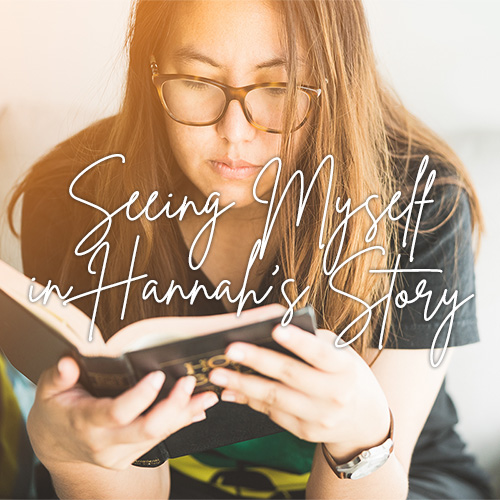Seeing Myself in Hannah’s Story

woman praying on holy bible in the morning.
In May of 2012, I walked down the aisle to the song “How Great Is Our God.” I was 33, my husband 34, and it had felt like we had waited an eternity for each other. Perhaps it didn’t feel like that to my now husband, Kevin. He’s much less dramatic than me. I knew that I wanted our wedding to be a taste of the wedding we’re really created for. The one where we meet our Savior, face to face, where we sit at the great wedding feast that will go down as the one for the ages, and praise the One who was faithful to us in the midst of our unfaithfulness. That day in May was perhaps one of the most purely joyful days of my life.
Yet, I could hardly imagine that “How Great Is Our God” would also be the song we would choose to sing as we held the lifeless body of our first daughter in a little hospital room where you could just barely catch a glimpse of the steeple of the little church we were married in only 14 months before. And then we would sing it again in another hospital room 14 months after losing our first daughter, as we would walk through the unimaginable and lose our second daughter. We chose that song because our daughters were experiencing the fullness of what our marriage was just a picture of: meeting our King, now theirs, face to face—as we all await that feast of the ages. And, most recently I remember singing the same song 15 months after burying our second daughter, with our little tiny son—who came into our lives through adoption—wrapped snuggly on my chest. A flood of emotions ran through me as I thought of all the seasons in our lives when that song has been sung.
It was a song that I would learn to sing in great joy and in deep pain, in great hope and in deep despair. And with much more simple words, it is a song that reflects much of what Hannah sings after her own season of despair in 1 Samuel 2.
It’s hard to imagine, when you read Hannah’s words of praise, that this was a woman who had experienced deep pain and heartache. And as I’ve reflected on Hannah’s story and my own, I have discovered that I have learned to sing her song of praise in much of the same ways as Hannah did. Don’t we all want our hearts to radiate the deep truths and joy we have in Christ? I think we often want it to come with ease, but the way in which one can learn to sing Hannah’s song is quite contrary to what we may think. Over the course of these six devotionals I want to share with you six ways displayed in Hannah’s life we come to be able to sing a song like hers. We could say her life and song are a pattern for praise. And the first way is through the unlikely companion of suffering.
As we look at Hannah’s life in 1 Samuel 1:1-5 we see that she was married to a man who had two wives, her and Peninnah. The second wife is very fertile, but God’s word specifically says, “but Hannah had no children.” Hannah was barren. And it was the Lord who had closed her womb. The very thing that gave value to the life of a woman in that culture, that provided protection for them as they become older, she did not have.[1]
Her suffering wasn’t only in not having what she longed for, but that Peninnah would “provoke her” every time they went up to the house of the Lord to worship (1 Samuel 1:5-9, ESV). Hannah’s suffering was both internal—wrestling with the unfulfilled longings of her heart—and external—provocation from Penniniah, highlighting what she was missing. And in the midst of Hannah’s pain, she presents her ache to her husband, and she receives not understanding but the response, “Am I not more to you than ten sons?” (1 Samuel 1:8, ESV). Am I not enough to fill that ache, my wife?
When I look at Hannah’s grief, I see myself in her story. My own suffering was in the loss of my first two daughters and the question of whether or not I would be able to have children biologically. And though our cultures are far different, the intense longing for a child seems to cross generations. However, the “Penniniahs” in my life are much subtler—through social media comes the constant awareness of others’ seeming “Picture Perfect” lives that I do not have. In my own story, friends around me had healthy babies at the same time as I lost mine. I was never provoked by anyone—they were kind to me—but simply seeing others receive what I desired still made me feel provoked. Perhaps you have your own “Penninahs”—daily provocations, highlighting what you don’t have and causing you to often wonder “God, where are You in this?” I remember often feeling as I looked around at others getting the circumstances I wanted—it felt as if God was not only asking me to suffer the loss of my children, but asking me to watch others get what I so desperately desired. It awakened in my heart deep sadness and even anger. But it also revealed my misplaced hope.
Robert Leighton has said, “God closes up the way to every broken cistern, one after another, that He may induce you, baffled everywhere else, to take the way to the fountain of living waters.”[2] What about you, will you let the suffering that God has allowed into your life to open your eyes to the places you have thought would give you life and then lead you to the fountain of living waters?
Lord, my pain runs deep today. I look around me and I see so many others who are experiencing the very things I long for and it pricks my heart to the core. These are the places where I desperately need You to meet me. I don’t know why You have allowed this suffering into my life, but would You take my suffering and allow it to be an instrument in Your loving hands to reveal the things You want to change in me? Would You teach me how to bring this pain and the deep, unmet longings of my heart to You more freely? And would You become my greatest source of life and joy not a part from this pain but because of it. I lay down my expectations for how I think You should show up and invite You to show up in my life in the ways only You know I need.
[1] Timothy J. Keller, “Hannah’s Prayer,” Gospel in Life, accessed October 15, 2017, https://www.gospelinlife.com/hannah-s-prayer-8872. [2] “Expositor’s Bible: The First Book of Samuel.” Christian Classics Ethereal Library. Accessed October 15, 2017. https://www.ccel.org/ccel/blaikie/expositor8.iii.html.
- Lindsey
Hope Mom to Sophie and Dasah Hi! I’m Lindsey. I live in Orlando, Florida with my stud of a husband Kevin. We have 3 incredible children, Sophie and Dasah who now live with Jesus and Jaden who came into our lives through adoption. We have a very energetic golden retriever and love living in the sunshine state. I get to spend my days loving on my son, investing my life in college students here through a non-profit organization we’re a part of and when I have time, writing on my blog about the hope that doesn’t disappoint!
Hi! I’m Lindsey. I live in Orlando, Florida with my stud of a husband Kevin. We have 3 incredible children, Sophie and Dasah who now live with Jesus and Jaden who came into our lives through adoption. We have a very energetic golden retriever and love living in the sunshine state. I get to spend my days loving on my son, investing my life in college students here through a non-profit organization we’re a part of and when I have time, writing on my blog about the hope that doesn’t disappoint!
Are you a writer who would like to join the blog team? Learn more and apply here.

